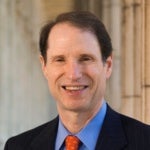Section 230, a usually obscure clause of an internet law written in 1996, might just turn out to be one of the biggest flash-points of the 2020 election. In recent days, the long-running tension between the President, his allies, and social media platforms has erupted into an unprecedented showdown—and raised complex questions about censorship, the First Amendment, and the true intent of this section of the Communications Decency Act. As private platforms become critical public megaphones, what are the their rights—and obligations—when it comes to policing speech on topics from public health to politics?
We are joined by:
- Ron Wyden, U.S. Senator, Oregon
- Mary Anne Franks, President and Legislative and Tech Policy Director, Cyber Civil Rights Initiative
- Kate Klonick, Assistant Professor, St. John’s University Law School
- Tim Wu, Professor, Columbia Law School
- Vivian Schiller, Executive Director, Aspen Digital

Senator Ron Wyden is one the foremost defenders of Americans’ civil liberties in the U.S. Senate, and a tireless advocate for smart tech policies. Wyden has fought to protect Americans’ privacy and security against unwanted intrusion from the government, criminals and foreign hackers alike. He has opposed the government’s efforts to undermine strong encryption, proposed legislation to hold companies accountable for protecting their users’ data, and authored legislation with Rand Paul to protect Americans’ Fourth Amendment rights at the border. Wyden is a senior member of the Senate Select Committee on Intelligence and the top Democrat on the Senate Finance Committee. He lives in Portland, Oregon.
 Mary Anne Franks is a Professor of Law and Dean’s Distinguished Scholar at the University of Miami School of Law, where she teaches First Amendment law, law and technology, and criminal law and procedure. She is the President and Legislative and Tech Policy Director of the Cyber Civil Rights Initiative, a nonprofit organization dedicated to combating online discrimination and abuse. Dr. Franks is also an Affiliate Fellow of the Yale Law School Information Society Project (ISP). She is the author of the award-winning book The Cult of the Constitution: Our Deadly Devotion to Guns and Free Speech (Stanford 2019). Dr. Franks drafted the first model criminal statute on nonconsensual pornography (aka “revenge porn”) in 2013 and regularly advises legislators and tech industry leaders on online abuse and privacy issues. She holds a J.D. from Harvard Law School and a D.Phil. and M.Phil. from Oxford University, where she studied as a Rhodes Scholar.
Mary Anne Franks is a Professor of Law and Dean’s Distinguished Scholar at the University of Miami School of Law, where she teaches First Amendment law, law and technology, and criminal law and procedure. She is the President and Legislative and Tech Policy Director of the Cyber Civil Rights Initiative, a nonprofit organization dedicated to combating online discrimination and abuse. Dr. Franks is also an Affiliate Fellow of the Yale Law School Information Society Project (ISP). She is the author of the award-winning book The Cult of the Constitution: Our Deadly Devotion to Guns and Free Speech (Stanford 2019). Dr. Franks drafted the first model criminal statute on nonconsensual pornography (aka “revenge porn”) in 2013 and regularly advises legislators and tech industry leaders on online abuse and privacy issues. She holds a J.D. from Harvard Law School and a D.Phil. and M.Phil. from Oxford University, where she studied as a Rhodes Scholar.
 Kate Klonick joined the St. John’s Law School faculty in 2018. She teaches Property, Internet Law, and a seminar on information privacy. Klonick’s research centers on law and technology, using cognitive and social psychology as a framework. Most recently she has been studying and writing about private Internet platforms and how they govern online speech. Professor Klonick holds an A.B. with honors from Brown University where she studied both modern American History and cognitive neuroscience, a J.D. from Georgetown University Law Center where she was a Senior Editor on the Georgetown Law Journal, and a Ph.D. in Law from Yale Law School where she was also a resident fellow at the Information Society Project. She clerked for Hon. Eric N. Vitaliano of the Eastern District of New York and Hon. Richard C. Wesley of the Second Circuit. She is an affiliated fellow at the Yale Law School Information Society Project where she is spending the Fall of 2019 while on research leave to write on the topics of platform governance and oversight.
Kate Klonick joined the St. John’s Law School faculty in 2018. She teaches Property, Internet Law, and a seminar on information privacy. Klonick’s research centers on law and technology, using cognitive and social psychology as a framework. Most recently she has been studying and writing about private Internet platforms and how they govern online speech. Professor Klonick holds an A.B. with honors from Brown University where she studied both modern American History and cognitive neuroscience, a J.D. from Georgetown University Law Center where she was a Senior Editor on the Georgetown Law Journal, and a Ph.D. in Law from Yale Law School where she was also a resident fellow at the Information Society Project. She clerked for Hon. Eric N. Vitaliano of the Eastern District of New York and Hon. Richard C. Wesley of the Second Circuit. She is an affiliated fellow at the Yale Law School Information Society Project where she is spending the Fall of 2019 while on research leave to write on the topics of platform governance and oversight.
 Tim Wu, widely known for coining the term net neutrality in 2002 and championing the equal access to the Internet, writes and teaches about private power, free speech, and information warfare. In recent years he has been a leader in the revitalization of American antitrust and has taken a particular focus on the growing power of the big tech platforms. A professor at Columbia Law School since 2006, Wu has also held posts in public service. He was enforcement counsel in the New York Attorney General’s Office, worked on competition policy for the National Economic Council for the Obama White House, and worked in antitrust enforcement at the Federal Trade Commission. Wu is a member of the American Academy of Arts and Sciences. He served as a law clerk for Justice Stephen Breyer of the U.S. Supreme Court and Judge Richard Posner of the U.S. Court of Appeals for the 7th Circuit.
Tim Wu, widely known for coining the term net neutrality in 2002 and championing the equal access to the Internet, writes and teaches about private power, free speech, and information warfare. In recent years he has been a leader in the revitalization of American antitrust and has taken a particular focus on the growing power of the big tech platforms. A professor at Columbia Law School since 2006, Wu has also held posts in public service. He was enforcement counsel in the New York Attorney General’s Office, worked on competition policy for the National Economic Council for the Obama White House, and worked in antitrust enforcement at the Federal Trade Commission. Wu is a member of the American Academy of Arts and Sciences. He served as a law clerk for Justice Stephen Breyer of the U.S. Supreme Court and Judge Richard Posner of the U.S. Court of Appeals for the 7th Circuit.
 Vivian Schiller is Executive Director of Aspen Digital. Over the last 30 years, Vivian has held executive roles at some of the most respected media organization in the world. Those include: President and CEO of NPR; Global Chair of News at Twitter; General Manager of NYTimes.com; Chief Digital Office of NBC News; chief of the Discovery Times Channel, a joint venture of The New York Times and Discovery Communications; and head of CNN documentary and long form divisions. Documentaries and series produced under her auspices earned multiple honors, including three Peabody Awards, four Alfred I. DuPont-Columbia University Awards, and dozens of Emmys. Schiller is a member of the Council on Foreign Relations; and a Director of the Scott Trust, which owns The Guardian. She is also strategic advisor to Craig Newmark Philanthropies.
Vivian Schiller is Executive Director of Aspen Digital. Over the last 30 years, Vivian has held executive roles at some of the most respected media organization in the world. Those include: President and CEO of NPR; Global Chair of News at Twitter; General Manager of NYTimes.com; Chief Digital Office of NBC News; chief of the Discovery Times Channel, a joint venture of The New York Times and Discovery Communications; and head of CNN documentary and long form divisions. Documentaries and series produced under her auspices earned multiple honors, including three Peabody Awards, four Alfred I. DuPont-Columbia University Awards, and dozens of Emmys. Schiller is a member of the Council on Foreign Relations; and a Director of the Scott Trust, which owns The Guardian. She is also strategic advisor to Craig Newmark Philanthropies.

